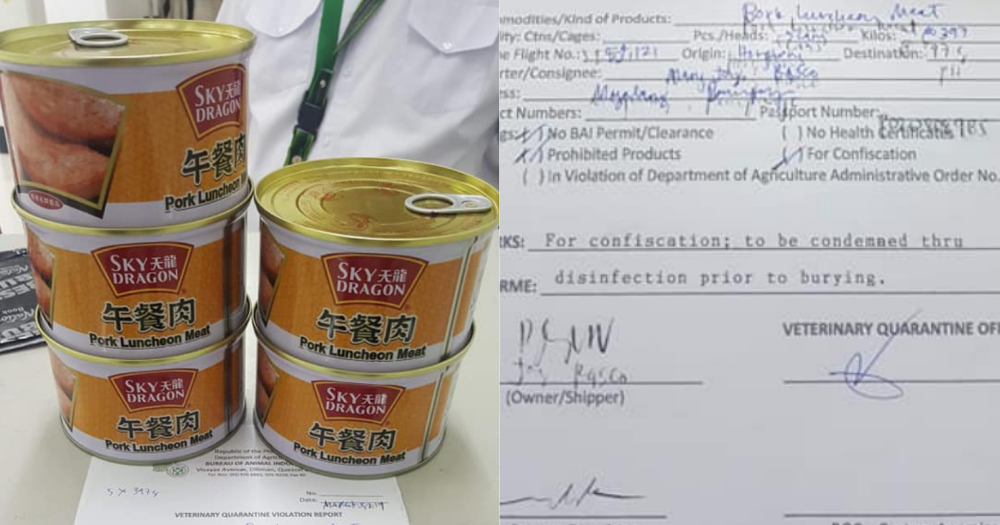On June 14, 2019, Filipino agricultural secretary, Manny Pinol, put up this Facebook post.
In it, some canned pork products confiscated at Clark International Airport on March 25, 2019, tested positive for the African Swine Fever (ASF) virus.The cans were from Hong Kong brand, Sky Dragon.
Not allowed in Singapore
Thanks to the stringent food safety measures taken by the Singapore Food Agency (SFA), this brand is banned in Singapore.
Speaking to The Straits Times, SFA confirmed that this brand is not allowed in Singapore because of its origin country, Hong Kong, which has ASF cases.
SFA elaborated that countries exporting raw pork to Singapore have to be free from ASF to mitigate the risk of introducing the virus to Singapore.
SFA has also suspended imports from affected places with some exception made to approved establishments in which their products will have to be heat-treated to inactivate the virus.
While there are measures put in place, Singaporeans should not belittle ASF.
If you are not aware of how severe this virus is, read on.
What is African swine fever?
The ASF is caused by a severe virus that can spread very quickly among pigs.
The virus can come from pigs, dead or alive, and even pork products like a pack of sausages.
ASF can be carried over long distances and cross national borders easily.
Pigs and wild boars infected with ASF usually die from a hemorrhagic fever.
There is no vaccination for ASF yet.
However, the ASF virus is, for the most part, harmless to human beings.
This virus is common in African countries but outbreaks have occurred in other parts of the world too.
Outbreaks in Asia
The first outbreak happened in China last August and has spread rapidly to other parts of Asia such as Hong Kong, Mongolia, Laos and Vietnam.
According to Reuters, the world's largest pork producer, China, has taken a hit with a breeding herd that is 22 percent smaller than this time last year.
Deputy Director General of World Organisation for Animal Health, Matthew Stone, also shared that China will take years to contain the ASF which implies a greater impact on the pork industry.
To cope with the impact of ASF, some pork sellers have to seek alternatives to earn a living for now.
Here's an example:
Unstoppable virus hitting Southeast Asia
Most recently, ASF has spread to the second largest pork producer in Asia — Vietnam, with more than 2.5 million pigs culled as of June 18, 2019.
In May, the Vietnamese Minister of Agriculture and Rural Development Nguyen Xuan Cuong called this "the most dangerous outbreak that the husbandry industry has faced so far", according to Xinhua News.
The virus has since spread to 58 out of 63 Vietnamese cities and provinces.
The first case of ASF was identified in a southern province in April and the virus has since spread down south of Vietnam where 23 percent of the national pig population is found.
The ministry also fears that the virus will spread further with farmers in the southern area being unaware of the impacts of ASF and the precautionary measures against it.
As such, some farmers have disposed of infected dead pigs into the surrounding.
Since the water and soil can be contaminated, it becomes even harder to contain the disease.
ASF can potentially become endemic in Southeast Asia, according to Science magazine.
A Hong Kong veterinary epidemiologist, Dirk Pfeiffer, also called this "the biggest animal disease outbreak" ever on Earth and there might be "no way to stop it from spreading".
Top photo collage from MannyPiñol
If you like what you read, follow us on Facebook, Instagram, Twitter and Telegram to get the latest updates.
